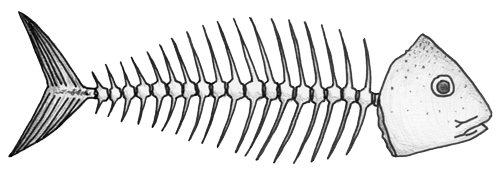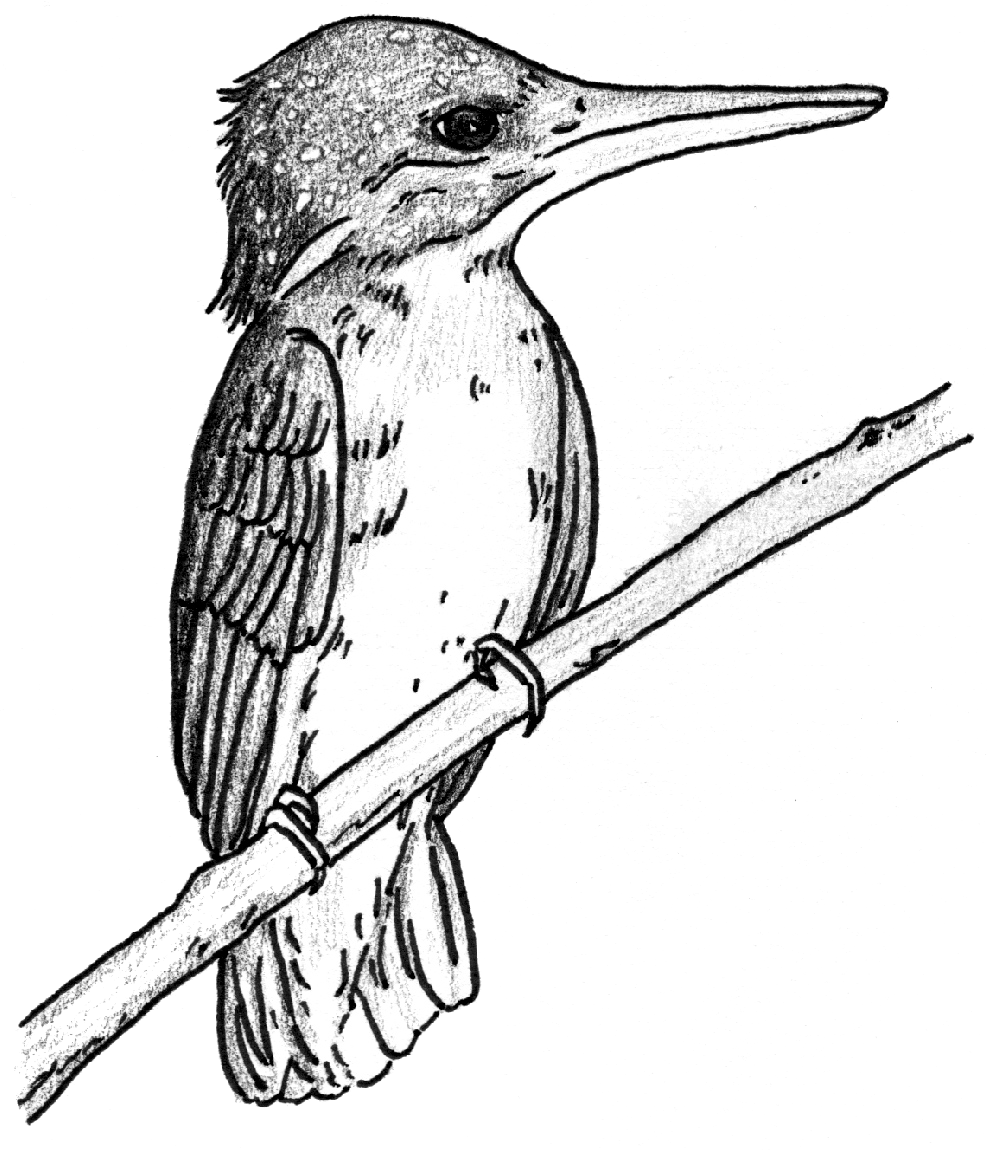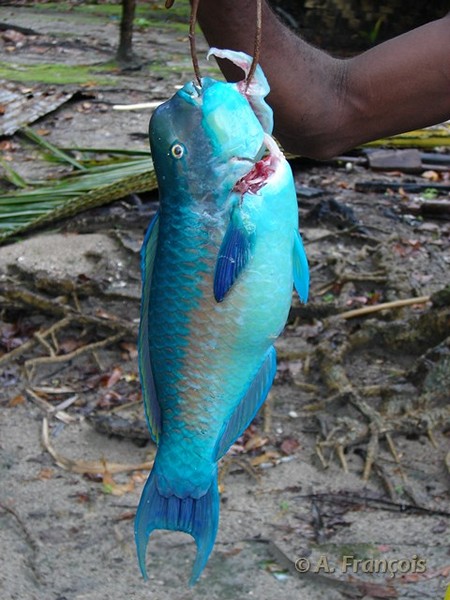POc*ra3 plural
Apersonal pronoun
Grammar
3rd person dual independent pronoun, referring to a pair of people already mentioned in discourse
1 – subjectthey
| Da tieli.subjectThey are siblings. |
| In’ ne me in’ re, da menuko.This man here, and that one there, they are friends. |
| Da ñoko lai-te ne kulumoe.Only they two were living in the village. |
2 – objectthem: anaphoric third dual pronoun, referring to a pair of people already mentioned in discourse
| Kape la-kila da.reflexiveThey’re going to marry [each other]. |
Bquantifier
Grammar
foll. by possessed kin termdyad: construction referring to a couple of kin-related individuals
| da til’ iape[lit. both his brother] two brothers |
| d’ ai’ iape[lit. both his father] a father–child pair |
| da gi’ iape[lit. both his uncle] an uncle–nephew pair |
| da pi’ iape[lit. both his grandfather] the grandfather and his grandson |
| da uk’ iape[lit. both his in-law] two in-laws |
1 – go past, cross ‹s.th., s.o.›
| Li-da dapa ne anoko.They crossed [lit. went past] each other on the road. |
| Li-da noma re i-ka.They came here rounding the cape over there. |
Averb, transitive
1 – often V2 in serial patternsurround ‹s.th.›, go around ‹a place›
| Noma, uña toñaki van li-ka li-dai temaka i-katau uña basakulumoe.In the olden days, large ships would sail around the archipelago, going from island to island. |
| Tetawene i-wen’ i-dai moe na.The drawings were running around the walls of the house. |
da= + *mala ‘white’ (?)
2 – collective use, even with no plural markerWesterners, whitemen
| Ka basavono ponu, mamote damala tae.In those times, there were no Westerners yet (in this area). |
| Li-romo ñe duduko we damala pe Franis.They watched with the looking glass of the French whitemen. |
ie damala adjective
of whitementypical of the Western world, modern (opp. iakapa, traditional)
| kuo ie damala[canoe of Westerners] a modern ship |
| kulumoe ie damala[village of Westerners] a city |
| dameliko 'nonemy children |
| dameliko viñevi[female children] little girls |
| buro ie damilikoa children’s song |
| Okoro pe dameliko li-moloe ñi tae.A knife is not for children to play with. |
| Ni-vodo ni-ko eo ka uña damiliko iono pi-te wako.I hope that you and your children are well. |
Apersonal pronoun
Grammar
1 – subject, object or possessoranaphoric third plural pronoun, referring to a group of people already mentioned in discourse
| Dapa li-madau.subjectThey were scared. |
| Ni-ovei dapa.objectI know them. |
| Li-pei dapa.reflexiveThey were rejoicing [themselves]. |
| kie dapapossessor of dependent nountheir graves |
| enga dapatheir names |
Bquantifier
2 – foll. by NP modifierin the absence of a noun head, dapa serves as head in a plural NP with human reference: ‘people’, ‘those (who+)’
| dapa bworo+adjectiveBlack people |
| dapa wopine [the great/old ones] grown men; authorities; ancestors |
| dapa IuraVanuatu people |
| dapa noma +adverbpeople of the past, ancestors |
| dapa peini toñaki pon+linkerthe people on that ship |
| dapa pe uña teliki li-lamini tanoe se dapa+relative clause with resumptivethose who were given land by the authorities |
plural of mwatageteyoung unmarried boys, typic. male teenagers
| Kape pe-loko dapa gete enone, da meliko viñevi, pe-lui ne moe re.We'll take my boys and my girls, and lead them to that house over there. |
| Dapa gete le-wabe, le-lui tev' dapa li-anu.The young men fill up (the cups) and give them to (the elders) for them to drink. |
| moe uña dapa getedouble pluralthe house of youngsters |
| Uña teliki samame dapa wopine li-waivo uña dapa gete ñe telepakau akapa.The chiefs and the elders teach youngsters about our culture. |
see singularmwatagete
dapa wopine ⁿdapa wopine
idi wopine
noun
1 – masculine and plurals.o.the great onesadult men, elderly men
| Bwara le-ko le-watebo iepiene teve uña dapa wopine.double pluralWe should rather ask the elders about those traditional stories. |
2 – ‘great men’: men of high rank, initiated men; hence chief
| Noma, idi wopine li-akawo kolokolo me i-botongo dapa.In ancient times, important men used to wear 'kolokolo' breast plates as a protection. |
| Li-koie takoie ne touro ponu, dapa wopine kula li-ke li-le.While they were walking up towards the shore, some of the [island's] chiefs walked down towards them. |
see singularmwaliko pine
dapenuo ⁿdapenuo
da penuo
noun
men: irregular plural of mwalikote ‘man, male’
| da-tilu penuo mwatagetetwo young men |
| Ruene iote ie da penuo, ka iote ie da viñevi.One door is for men, another one for women. |
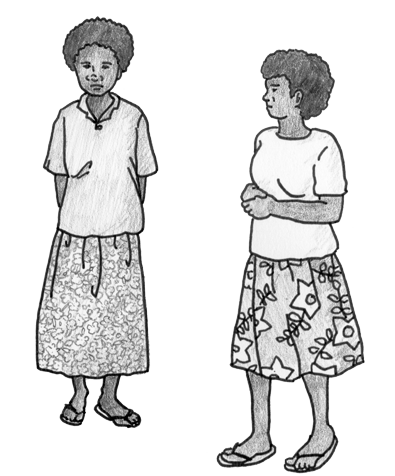
POc*pinewoman
women: irregular plural of emele ‘woman’
| makone ie da-viñevia women's dance |
| namolo ie daviñeviwomen's clothes |
| Daviñevi tete li-te ne moe pe li-apinu ene pon.There are three women sitting in the kitchen over there. |
| Da viñevi wopine li-ovei pe li-anu kava.Adult women can drink kava. |
| Temabete me mawene, li-garei pe daviñevi li-te ene.Women are forbidden from sitting on mats or semi-mats. |
Anatomy
animaltail
| Nga u-katei namuko iote, u-toe dekele mina.If you catch a fish, you must cut off its tail. |
demene ⁿdemene noun
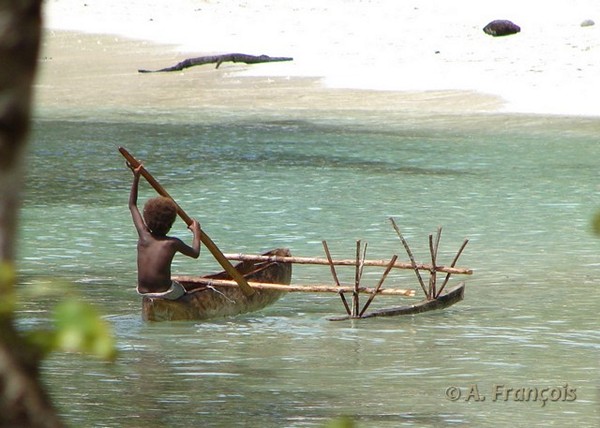
POc*saman
Techniques
outrigger of a canoe
| Po ka li-bo ebele kuo awoiu, kape le-toe demene peini na ta.Once the hull of the canoe is finished, it's time to cut its outrigger. |

| Li-kai bele dero.tear off the bark of the kaori tree |
| Abwa dero i-ke mina oie basavono po li-toe, i-ka i-beiu ka li-kila li-ko “tepulu peini dero”.The sap of the kauri tree runs out of the trunk when you cut it; then it solidifies, and we call it tepulu, “kauri gum”. |
~di (i·)ⁿdi verb, transitive
2 – shave ‹beard›
| U-di vagumia eo ko!Shave your beard! |
Shaving ✧ Li-di idi
Noma, nuduko, ero pe i-wene ne moboe voko ne noma. Li-romo dapa ñepe ene, li-la ije boe li-di ñei vagumia dapa ka viabasa dapa.
In the past, our mirrors were just water puddles in a stone hole on the reef. Looking at themselves in the water, men would use a shark tooth to shave their beard or their head.
dienebe ⁿdieneᵐbe noun
digo ⁿdiᵑgo noun
Architecture
vertical post holding the walling of a house (telemoe), and supporting a tie-beam (basadigo).
| Li-toe iuro, ae, digo, we uña ngatene nga pon, peini kape le-vo.They made pillars, beams, and all the pieces so they could build [the house]. |
📘 This post is of secondary importance – opp. iutego ‘main supporting pillar’.
diro ⁿdiro noun
arrow, dart, used in hunting (opp. puro, arrow used in warfare)
| Diro, li-le ne ngogoro li-avi otovo; awoiu li-la iadiro peini, li-bo diro.You go to the bush, collect sago leaves; take out their midribs, and sharpen them into darts. |
| Pe li-wete telupe, u-avi visone ka u-iui diro i-le i-wete ini.When you hunt pigeons, you bend your bow, and let the arrow fly and hit it. |
TechnHunting arrows diro are made with the midrib of a sago leaf (iadiro peini otovo). Being made of a single piece, they have a simpler design than combat arrows puro.
mata diro noun
point of arrowtip of arrow
| vebe mata-diro analogy of shape[lit. arrow-tip vebe] kind of Barringtonia fruit |
Words for planting ✧ ~do
| ~do | plant ‹tree, flower› |
| ~teli | plant ‹fruit, taro› |
| ~vo ④ | plant ‹bananas› |
| ~woi | plant ‹maniok› |
| ~wowo ③ | plant ‹yam, tuber |
| vese | seed |
| mata ①▻⑨ | sprout |
| jie | taro shoot, sucker |
| ekuo | digging stick |
plant ‹trees›
| Li-do baleplant a breadfruit |
| Li-do balaweplant a pineapple |
| Li-do mana viloplant flowers |
| La-tabe mata ka la-lui la-do i-katau ngogoro.kaori treeThey collected shoots, and began to plant them around the island. |
| Ai-e mana luro wako? – Ewe. – Pe li-sava!jokeDo you like rice? – Yes I do. – Then just buy it! |
POc*ⁿdolom
swallow
| U-do etapu.Don't swallow it. |
| U-romo nga die, nara kape u-do i-abu.Beware the bones, you might swallow them. |
~do3 (i·)ⁿdo verb, transitive
scrape off ‹fish scales, ngava› when scaling a fish
| U-do ngava, awoiu u-ia bea mina.You scrape off the scales, and then gut it. |
be wet, damp
| Uña namolo enone mamote i-dobuo.My clothes are still wet. |
| Tokoli i-dobuo pe tebo, ka i-mu tamwase.The bridge is wet due to the rain, it's very slippery. |
antonymmimione
